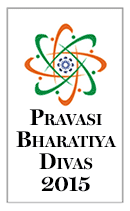
The time is nigh for India to ensure that investment by its former citizens is encouraged by protecting their rights, says C B Patel.
As India gears up to honour its pravasis on January 9 to mark their contribution in the nation’s development, Rediff.com presents perspectives from eminent writers on the Diaspora.
Earlier in this series:
A look back in anxiety
The coup that changed India's Diaspora policy
Friends of India
'India has stayed in my blood'
Bharat Mata and her children
Build and they will come
As a Rashtriya Swayamsevak Sangh pracharak, Narendra Modi travelled widely throughout India during his most formative years -- from late teens to his early 20s -- similar to both Mahatma Gandhi and Sardar Patel who also visited various parts of India and acquired their knowledge of the country before they came onto the national stage.
Modi’s organisational skills and prowess consequently have strong foundations, based on meeting many people in many places and always with a perceptive mind, which has enabled him to understand and interpret the needs, expectations and aspirations of people throughout the country.
He has also travelled to various countries in Europe, America, Africa and Australia since the 1980s, even before entering politics when he joined the Bharatiya Janata Party.
With his impressive oratorical skills, Modi had soon acquired a huge swathe of admirers, well-wishers and supporters long before becoming the chief minister of the state of Gujarat.
These are my expectations from Prime Minister Modi in relation to Overseas Indians, especially NRIs, PIO and OCI card holders.
1. Keeping in mind the importance and necessity of preserving ties with the ancestral homeland, overseas Indians in the United Kingdom are extremely keen to be able to receive visitor visas on arrival as has been recently granted to residents of several other countries. (At the time of publishing this report, Prime Minister Modi had announced life time visas for PIO cardholders)
In the absence of this facility, provision of services at the India diplomatic centres abroad could, and should, be more professional, efficient and operate with a basic sense of civility and courtesy, but customer care is not readily available at our high commission or embassies.
The procedure for OCI applications is also unnecessarily complex and cumbersome and needs to be simplified, especially with regards to the requirements for documentation for deceased parents which is extremely susceptible to corruption in any case. 2. Indians abroad, especially in developing countries, deserve special attention from the Indian government.
2. Indians abroad, especially in developing countries, deserve special attention from the Indian government.
In certain countries in the Middle East there is a dire need to secure the welfare, status and security of the children of Mother India. We hope and expect Modi’s government to take a firm stand in this matter.
3. After decades living in the US and UK most Indian origin persons living abroad expect a clean, efficient and corruption-free India. Three years ago my news weeklies (Asian Voice and Gujarat Samachar) organised a public meeting in London.
There were 76 instances of real-estate -- residential and commercial properties -- and bank account misappropriation by fraudsters, including relatives, minor bureaucrats and even religious establishments.
We prepared a thorough dossier, which was sent to the minister in the state of Gujarat. Shockingly, nothing fruitful came of it. The time is nigh for India to ensure that investment by its former citizens is encouraged by protecting their rights.
4. The image of India as a progressive country, with the benefits of economic development percolating to the lower levels of society, are essential in uniting the country and to keep the younger generation in the fold.
If the general perception in the minds of overseas Indian prevails that the Indian government is not concerned about the despondency and helplessness of the vulnerable, then it will not promote self-respect and confidence among overseas Indians.
5. The present controversy about religious conversion itself is misleading, naturally from vested interests. The Economist wrote about the census report of 2011, not yet published by the Indian government, that the percentage of Christians and Muslims in 1947 was one percent and 9.3 percent respectively.
By 2011, the figures have risen to 3 percent for Christians and 14.9 percent for Muslims. Perhaps that was the reason why the United Progressive Alliance government suppressed the statistics.
The root cause of modern conflicts lies at the doorstep of coerced and forced conversions. Christianity and Islam spread through their rulers. The missionary activities are helped by the billions of dollars to spread their faith in India and China.
Huge amounts of petrodollars are being channeled or spent to promote Islam, especially Wahabbi and jihadi movements. The Indian government can and should take appropriate steps, within the framework of the Constitution, to eradicate such movements.
C B Patel is the editor and publisher of Gujarat Samachar.









